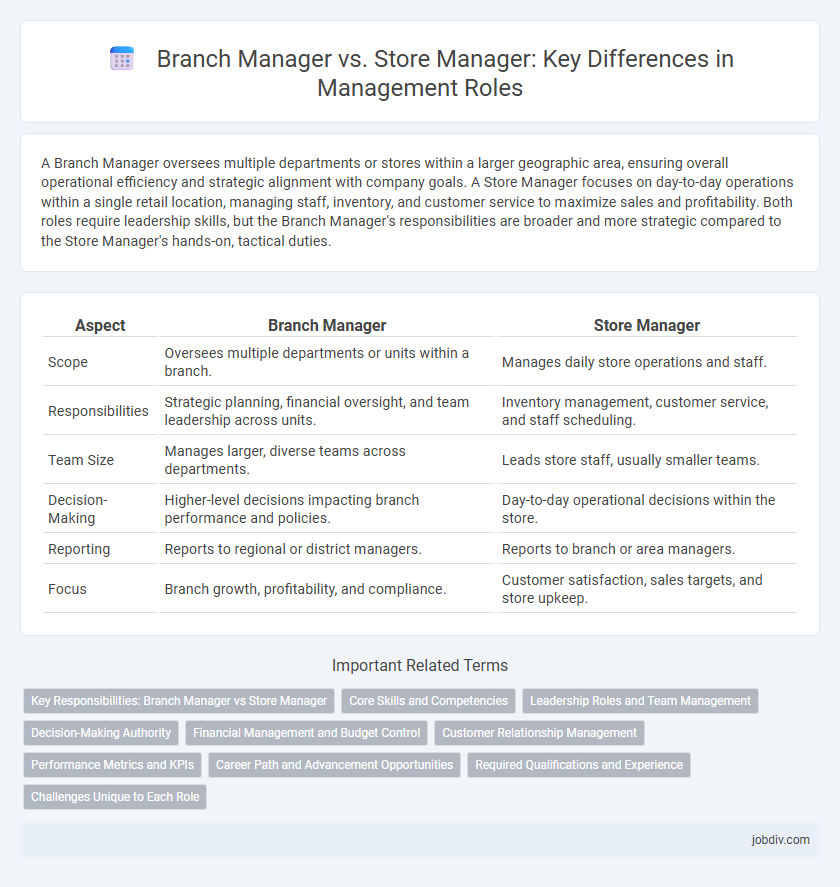A Branch Manager oversees multiple departments or stores within a larger geographic area, ensuring overall operational efficiency and strategic alignment with company goals. A Store Manager focuses on day-to-day operations within a single retail location, managing staff, inventory, and customer service to maximize sales and profitability. Both roles require leadership skills, but the Branch Manager's responsibilities are broader and more strategic compared to the Store Manager's hands-on, tactical duties.
Table of Comparison
| Aspect | Branch Manager | Store Manager |
|---|---|---|
| Scope | Oversees multiple departments or units within a branch. | Manages daily store operations and staff. |
| Responsibilities | Strategic planning, financial oversight, and team leadership across units. | Inventory management, customer service, and staff scheduling. |
| Team Size | Manages larger, diverse teams across departments. | Leads store staff, usually smaller teams. |
| Decision-Making | Higher-level decisions impacting branch performance and policies. | Day-to-day operational decisions within the store. |
| Reporting | Reports to regional or district managers. | Reports to branch or area managers. |
| Focus | Branch growth, profitability, and compliance. | Customer satisfaction, sales targets, and store upkeep. |
Key Responsibilities: Branch Manager vs Store Manager
Branch Managers oversee multiple departments within a bank or company branch, focusing on financial performance, compliance, and staff management to ensure operational efficiency. Store Managers handle daily retail operations, including inventory control, customer service, and sales targets, directly managing store employees and floor activities. Both roles require leadership skills, but Branch Managers prioritize strategic planning and regulatory adherence, while Store Managers concentrate on merchandising and customer engagement.
Core Skills and Competencies
Branch Managers excel in strategic leadership, financial oversight, and team development, ensuring alignment with corporate goals and regulatory compliance. Store Managers focus on operational efficiency, customer service excellence, and inventory management, driving daily sales performance and employee motivation. Both roles require strong communication, decision-making, and problem-solving skills, but Branch Managers demand a broader scope in business acumen and multi-location coordination.
Leadership Roles and Team Management
Branch Managers oversee multiple departments or stores within a geographic area, focusing on strategic leadership, operational efficiency, and aligning branch goals with corporate objectives. Store Managers handle day-to-day store operations, directly managing frontline staff, customer service quality, and inventory control to ensure smooth functioning at the store level. Effective leadership in a Branch Manager role involves higher-level decision-making and cross-team coordination, while Store Managers emphasize hands-on team management and execution of store-level policies.
Decision-Making Authority
Branch Managers hold broader decision-making authority, overseeing multiple departments and strategic initiatives across the entire branch, including financial management and staffing. Store Managers focus on operational decisions within a single store, managing daily activities, employee scheduling, and customer service execution. The scope of authority for Branch Managers is typically higher, involving long-term planning and budget approvals, while Store Managers handle immediate, on-the-ground problem solving.
Financial Management and Budget Control
A Branch Manager oversees multiple store locations, focusing on large-scale financial management and strategic budget control to ensure overall profitability and financial health across all branches. In contrast, a Store Manager handles day-to-day financial operations within a single location, including expense tracking, inventory budgeting, and local sales targets. Both roles require strong financial oversight, but the Branch Manager's responsibilities involve higher-level fiscal planning and resource allocation.
Customer Relationship Management
Branch Managers oversee multiple aspects of customer relationship management by implementing strategic initiatives to enhance customer satisfaction and loyalty across various departments. Store Managers focus on direct interaction with customers, ensuring day-to-day service quality and immediate resolution of customer issues to drive sales and retention. Both roles prioritize customer relationship management but operate at different scales and scopes within the organization.
Performance Metrics and KPIs
Branch Manager performance metrics emphasize financial targets, including profit margins, loan growth, and regulatory compliance, ensuring overall business unit success. Store Manager KPIs focus on sales volume, inventory turnover, customer satisfaction scores, and employee productivity to drive retail operations efficiency. Evaluating these distinct performance indicators enables organizations to align management roles with strategic objectives effectively.
Career Path and Advancement Opportunities
Branch Managers oversee multiple departments within a financial or corporate branch, requiring strong leadership skills and strategic planning experience, positioning them for senior management roles such as Regional Manager or Director. Store Managers focus on daily retail operations, staff management, and sales targets, providing a foundation for advancing into district or area management positions within retail chains. Career advancement for Branch Managers often involves broader operational responsibilities, while Store Managers progress through hands-on retail expertise and team leadership development.
Required Qualifications and Experience
Branch Managers typically require a bachelor's degree in business administration or management, combined with 5-7 years of supervisory experience in a related industry. Store Managers often need a high school diploma or associate degree, with 3-5 years of retail management experience emphasizing team leadership and customer service. Both roles demand strong organizational skills and a proven track record in managing operations, but Branch Managers usually require more advanced qualifications and strategic planning expertise.
Challenges Unique to Each Role
Branch Managers face challenges related to overseeing multiple departments and ensuring consistent performance across diverse teams, while Store Managers primarily focus on day-to-day retail operations and customer service excellence. Branch Managers must navigate complex regulatory compliance and strategic regional growth, whereas Store Managers handle inventory management, staff scheduling, and direct engagement with customers. Both roles require leadership skills, but Branch Managers deal with broader organizational objectives and higher-level stakeholder communication.
Branch Manager vs Store Manager Infographic

 jobdiv.com
jobdiv.com